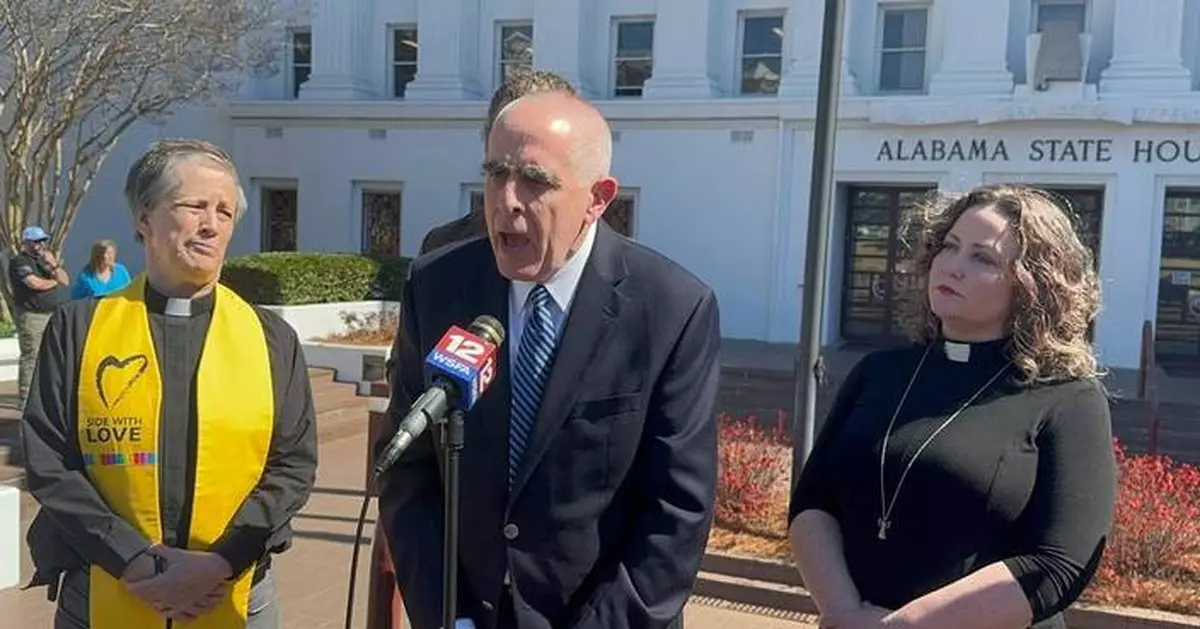MONTGOMERY, Ala. (AP) — Alabama lawmakers approved a slew of bills on Thursday that would expand the use of Christian texts in public schools and limit protections for LGBTQ+ students, in lockstep with a national conservative agenda that has divided statehouses across the country.
Three bills led to hours of debate in the Republican-dominated Alabama House of Representatives on Thursday. The bills — passed with overwhelming majorities — would mandate in public schools the display of the Ten Commandments, ban drag shows, prohibit teachers from displaying pride flags or facilitating formal discussion of sexuality, and allow chaplains to volunteer as school counselors.
Speaker of the House Nathaniel Ledbetter described the bills as “common sense” while members of the Democratic caucus condemned the legislation as “a waste of taxpayer money” that “won't bring down the cost of eggs.”
The legislation is part of a widespread effort in conservative states to regulate how schools handle social issues, a mission that has been championed by President Donald Trump.
Alabama joins at least 20 states that have considered legislation in 2025 that would mandate the display of the Ten Commandments in public schools or state buildings, according to an Associated Press analysis using the bill-tracking software Plural.
The sponsor of Alabama's Ten Commandments bill, Rep. Mark Gidley, said that he did not want to promote one particular religion. Instead, he said the bill recognizes the Ten Commandments, which appear in the Old Testament of the Bible, as "one of the principal foundational documents that guided the ideas that created this great country." The legislation said that the display should be supplemented by materials that emphasize its historical context.
In 2024, Louisiana became the first state to require that the Ten Commandments be displayed in every classroom in public schools and colleges. The law was blocked by a federal judge last year who ruled the law had an “overtly religious” purpose.
The push for the Ten Commandments in public places is far from new in Alabama.
But in past weeks, the bills have drawn vocal protest from religious leaders around the state who believe the slate of religious legislation will violate the First Amendment and create a hostile environment for religious minorities in Alabama public schools.
Steve Silberman, a rabbi who has worked at a synagogue in Mobile for 35 years, testified at a March committee hearing that he is concerned the Ten Commandments bill “unfairly sidelines Alabamians who may have diverse views of religious traditions.”
On Thursday, many legislators came forward in support of the bill.
"If you look around our nation, if you look around the world, we see so much of our Western civilization crumbling because we have forsaken the roots and foundations upon which we were built,” Republican Rep. Ernie Yarbrough said.
On the same day, representatives also swiftly passed two separate bills that would ban drag performances at public schools and libraries without parental consent, and ban teachers from displaying pride flags or facilitating formal discussion on LGBTQ+ issues.
Rep. Neil Rafferty, Alabama’s only openly gay legislator, testified against the bill.
“When we ban their identities from the classroom, we are telling them that the best they can hope for is silence," Rafferty said.
He added, "I won’t help silence them, because I’ve been there, because I know what that silence feels like.”
Arkansas, Indiana, Iowa, Kentucky and North Carolina are among the states with versions of Alabama’s existing “Don't Say Gay” law, passed in 2022, which already prohibits formal class discussion about gender and sexuality that is not “age appropriate” for students below the fifth grade. The proposed law would extend that ban to all grade levels.
A similar Florida law was rolled back in a legal settlement last year between civil rights groups and the state education department.
Also on Thursday, the Alabama Senate also advanced legislation that would put a politically appointed board in control of the Alabama Department of Archives and History. The change was first proposed last year after some lawmakers became upset about the department hosting a 2023 lecture on LGBTQ+ history.
Republican Sen. Chris Elliott, the sponsor of the bill, on Thursday praised the work of the department, but said the change is needed to ensure there is “accountability of the board back to elected officials.”
At a recent rally outside of the statehouse, Chuck Poole, who was a Baptist pastor for 45 years across Mississippi, Alabama and Georgia, said he feels the recent slate of religious bills in Alabama are part of a broader push to promote Christian nationalism across the country.
“I think it’s rooted in fear, and it’s a fear that America is changing and we are losing power and control,” Poole said.
Associated Press writer Kim Chandler contributed reporting from Montgomery, Alabama.
Riddle is a corps member for The Associated Press/Report for America Statehouse News Initiative. Report for America is a nonprofit national service program that places journalists in local newsrooms to report on undercovered issues.
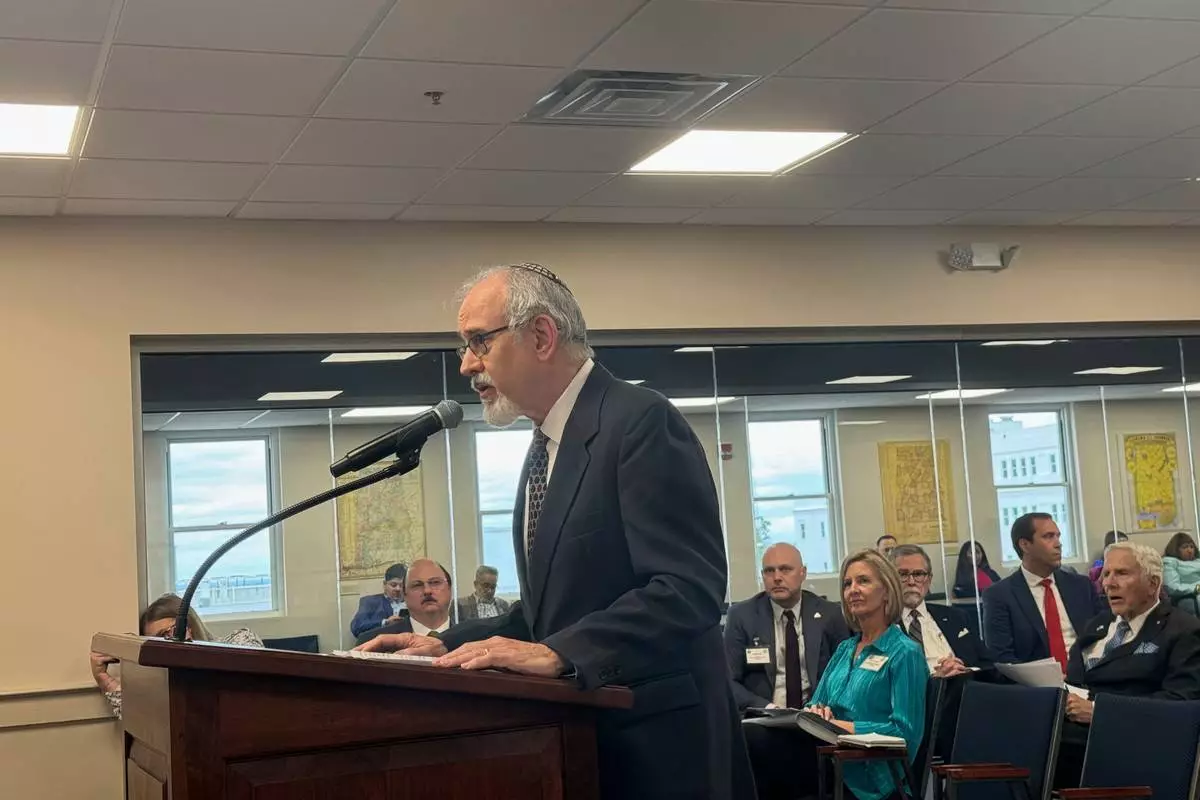
Steve Silverman, who has been a rabbi in Alabama for 35 years, testifies in front of state legislators, in Montgomery, Ala., March 5, 2025. (AP Photo/Safiyah Riddle)
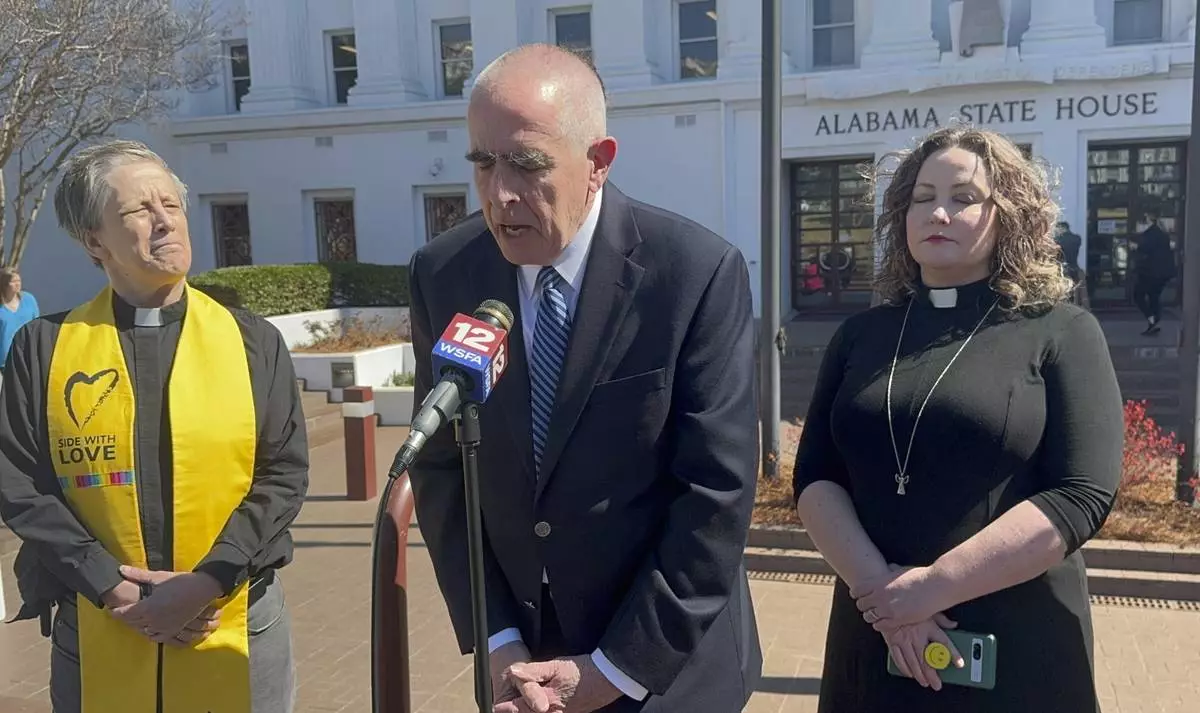
Chuck Poole joins other religious leaders to speak in front of the Alabama Statehouse against bills that would mandate religious texts and instruction in schools, in Montgomery, Ala., March 25, 2025. (AP Photo/Safiyah Riddle)
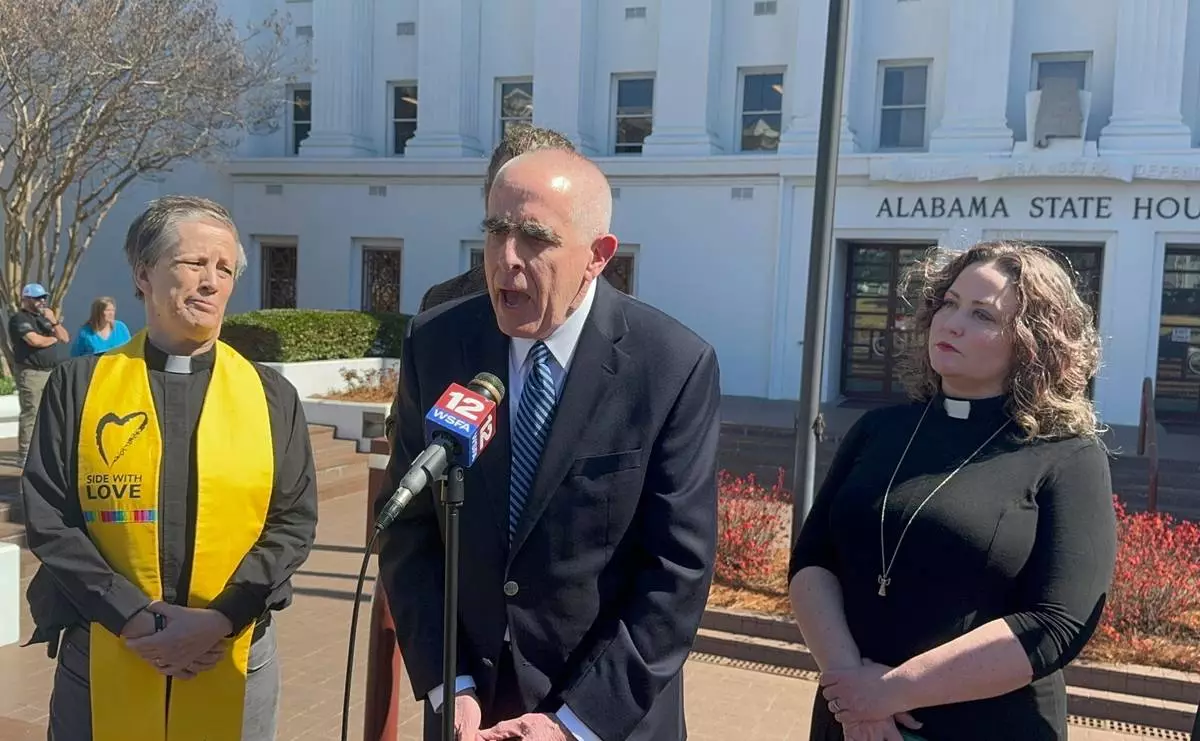
Chuck Poole joins other religious leaders to speak in front of the Alabama Statehouse against bills that would mandate religious texts and instruction in schools, Montgomery, Ala., March 25, 2025. (AP Photo/Safiyah Riddle)
NEW YORK (AP) — U.S. stocks rose following an encouraging report that showed inflation unexpectedly slowed across the country last month. The S&P 500 climbed 0.7% Tuesday and erased its loss for the year so far. The Dow Jones Industrial Average fell 0.6%, and the Nasdaq composite rose 1.6% as AI and other tech stocks led the way. The report on inflation could give the Federal Reserve more leeway to cut interest rates later this year to help the economy, but analysts and economists cautioned that inflation could still run higher in coming months because of President Donald Trump’s tariffs.
THIS IS A BREAKING NEWS UPDATE. AP’s earlier story follows below.
NEW YORK (AP) — Most U.S. stocks are rallying Tuesday following an encouraging report that showed inflation unexpectedly slowed across the country last month.
The S&P 500 was up 1% in late trading, coming off a big gain to start the week after the United States and China announced a 90-day pause in their trade war to allow for negotiations. The Dow Jones Industrial Average was down 160 points, or 0.4%, with an hour remaining in trading, and the Nasdaq composite was 1.8% higher as AI and other tech stocks led the way.
Stocks have been roaring back since the S&P 500 fell nearly 20% below its record last month on hopes that President Donald Trump will ease his stiff tariffs on trading partners worldwide before they create a recession and send inflation spiking higher. The S&P 500, which sits at the center of many 401(k) accounts, is back within 3.9% of its all-time high set in February and is back to positive for the year so far.
Tuesday’s report said that even with all the uncertainty around trade, and even with many businesses rushing to import products from other countries before tariffs raise their prices, inflation slowed to 2.3% last month from 2.4% in March.
It’s encouraging because such data pulls the economy further from a worst-case scenario called “stagflation,” one where the economy stagnates but inflation remains high. The Federal Reserve has no good way to fix that toxic combination. It could try to lower rates to help the economy, for example, but that would likely lead worsen inflation in the short term.
Even with Tuesday’s encouraging report, though, economists and analysts say inflation may still run higher in coming months because of Trump’s tariffs. That will likely leave the Fed waiting for more data to guide their decision on whether and when to cut interest rates in order to help the economy.
It’s similar to the wait that investors in general are enduring. With the Fed set to make no moves on interest rates for the time being, markets will likely trade “with negotiation and reconciliation headlines,” according to Alexandra Wilson-Elizondo, global cohead and co-chief investment officer of multi-asset solutions within Goldman Sachs Asset Management.
“I think investors are aware that the trade deal is not done yet,” said Louis Wong, director for Phillip Securities Group in Hong Kong.
“I would advise investors to remain cautious in the near term and to be prepared for unexpected news from the trade front,” he added.
On Wall Street, Coinbase Global jumped 25.1% after the cryptocurrency exchange learned its stock will join the widely followed S&P 500 index next week. That means many investment funds will likewise add it before trading begins on Monday. Coinbase will replace Discover Financial Services, which is getting bought by Capital One Financial.
Stocks in the artificial-intelligence industry were also strong. Nvidia rose 6.1% and was the biggest single force pushign upward on the S&P 500. It's partnering with Saudi Arabia’s sovereign wealth fund-owned AI startup Humain to ship 18,000 chips to the Middle Eastern nation to help power a new data center project.
Super Micro Computer, which builds servers used in AI, jumped 16.1%, and GE Vernova, which is hoping to power vast AI data centers, rose 5.7%. Palantir Technologies gained 9.2%.
They helped offset UnitedHealth Group, whose shares tumbled 17.6% after it suspended its full-year financial forecast due to higher-than-expected medical costs. The nation’s largest health insurer also announced that CEO Andrew Witty was stepping down for personal reasons and that Chairman Stephen Hemsley will become CEO, effective immediately.
UnitedHealth was the main reason the Dow lagged behind other U.S. stock indexes.
In the bond market, Treasury yields ticked higher with hopes for the U.S. economy. The yield on the 10-year Treasury rose to 4.50% from 4.45% late Monday.
The two-year Treasury yield, which moves more closely with expectations for Fed action, ticked up to 4.01% from 3.98%.
In stock markets abroad, indexes were mixed across Europe and Asia. Stocks fell 1.9% in Shanghai but rose 1.4% in Tokyo.
Automakers were among the big gainers in Japan. Nissan Motor Co. added 3% ahead of an announcement that it plans to lay off 20,000 of its workers as part of its restructuring efforts. The automaker said Tuesday that it racked up a loss of 670.9 billion yen ($4.5 billion) in the last fiscal year.
AP Business Writers Matt Ott and Elaine Kurtenbach and AP video journalist Alice Fung contributed.
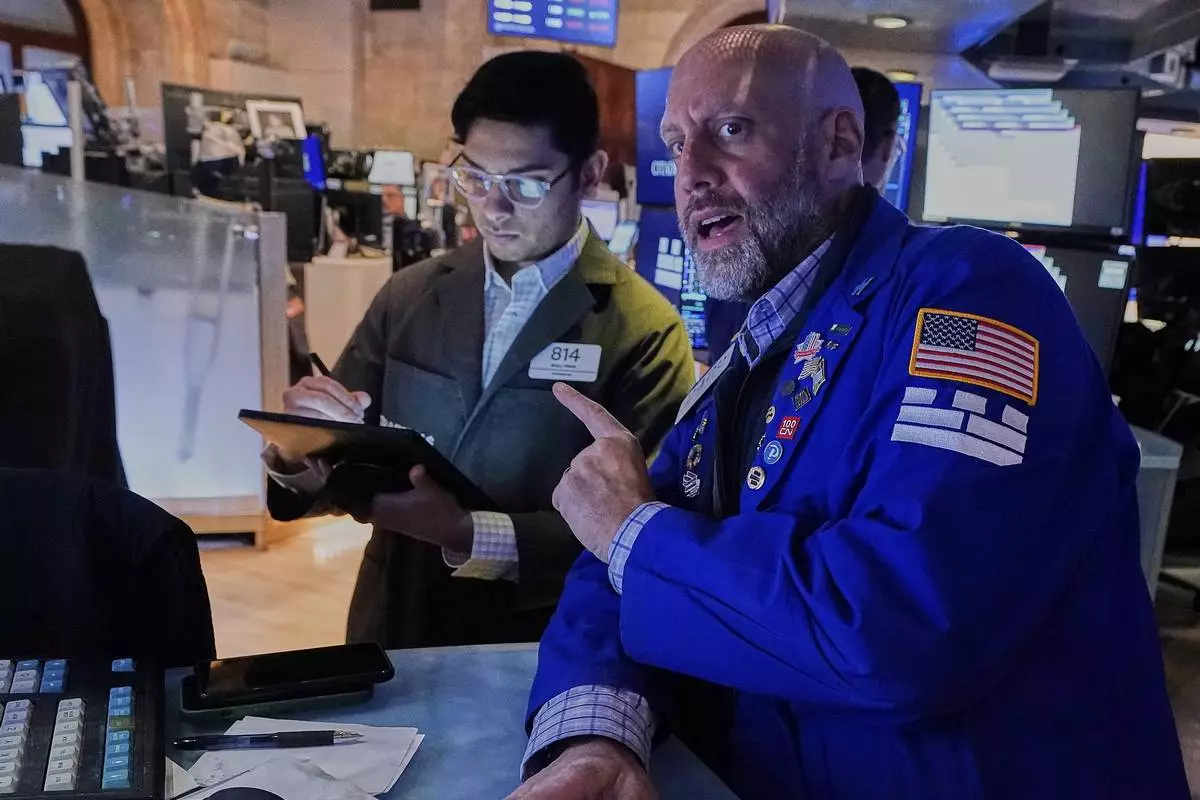
Trader Niall Pawa, left, and specialist Meric Greenbaum work on the floor of the New York Stock Exchange, Monday, May 12, 2025. (AP Photo/Richard Drew)
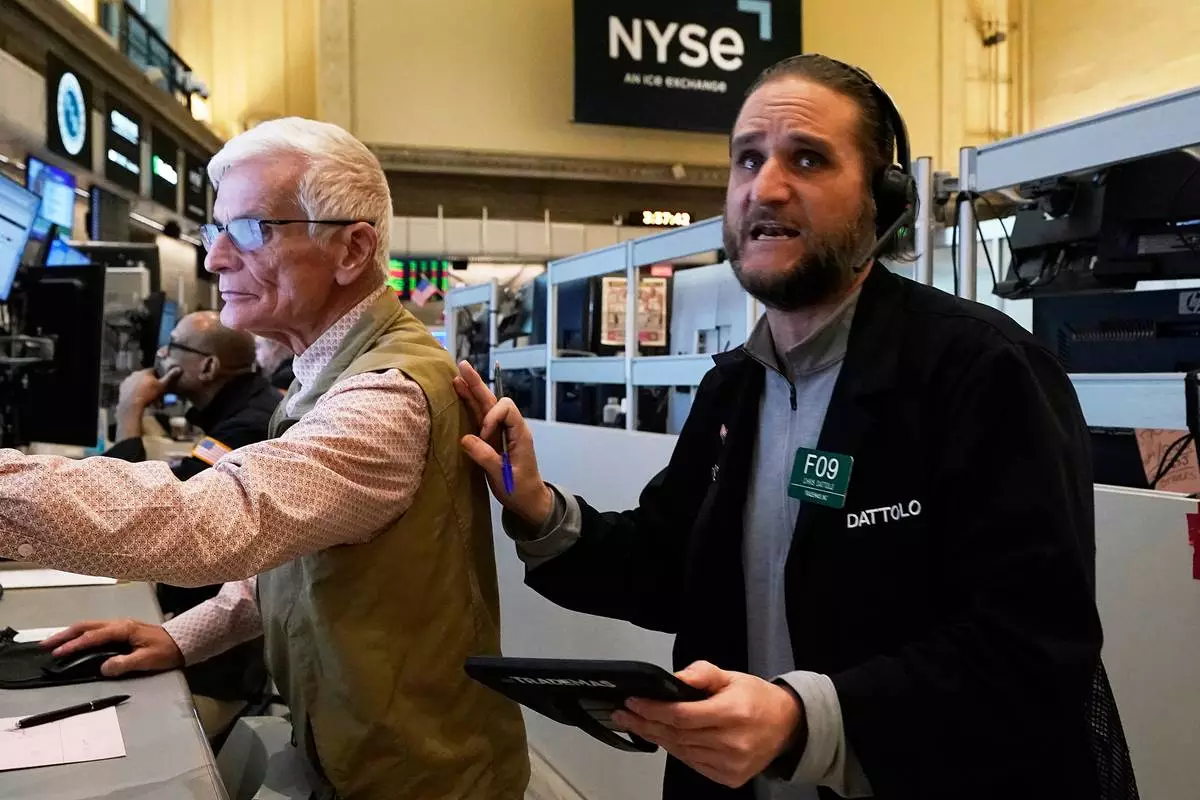
Options trader Chris Dattollo, right, works on the floor of the New York Stock Exchange, Monday, May 12, 2025. (AP Photo/Richard Drew)
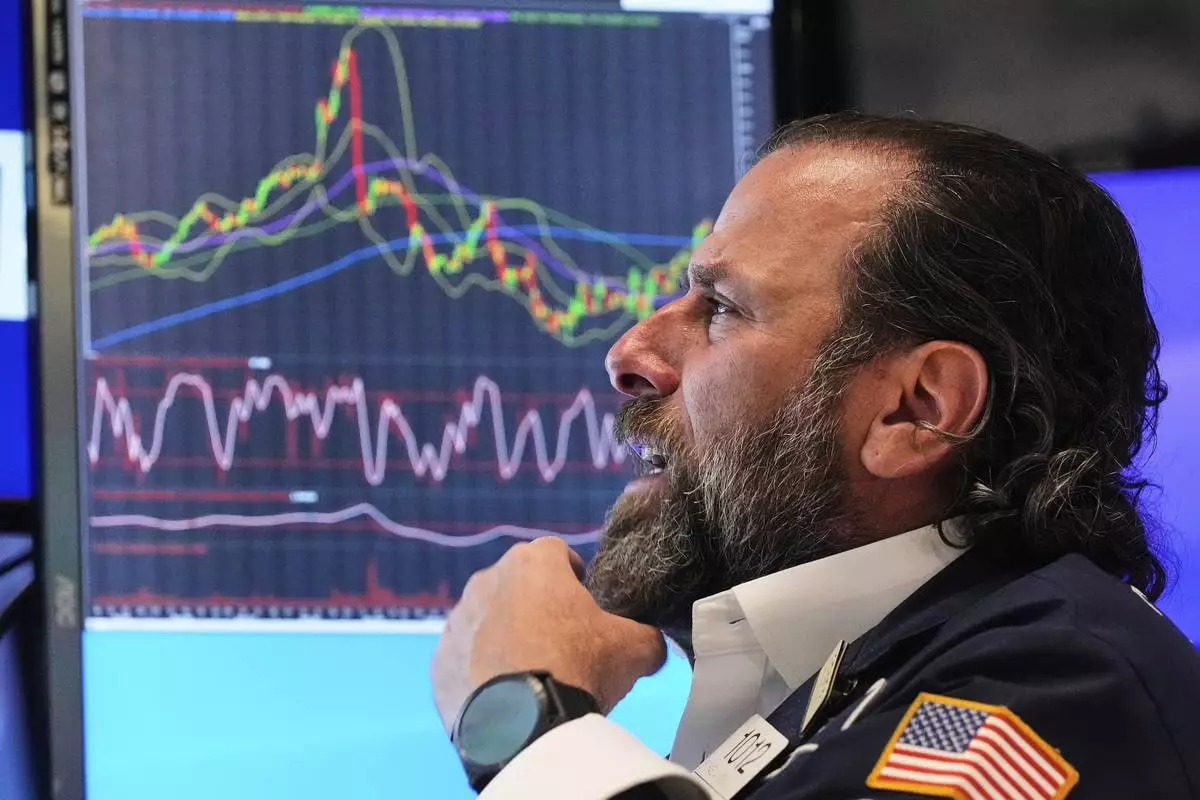
Specialist Michael Pistillo works at his post on the floor of the New York Stock Exchange, Monday, May 12, 2025. (AP Photo/Richard Drew)

A person walks in front of an electronic stock board showing Japan's Nikkei index at a securities firm Tuesday, May 13, 2025, in Tokyo. (AP Photo/Eugene Hoshiko)

A person walks in front of an electronic stock board showing Japan's Nikkei index at a securities firm Tuesday, May 13, 2025, in Tokyo. (AP Photo/Eugene Hoshiko)
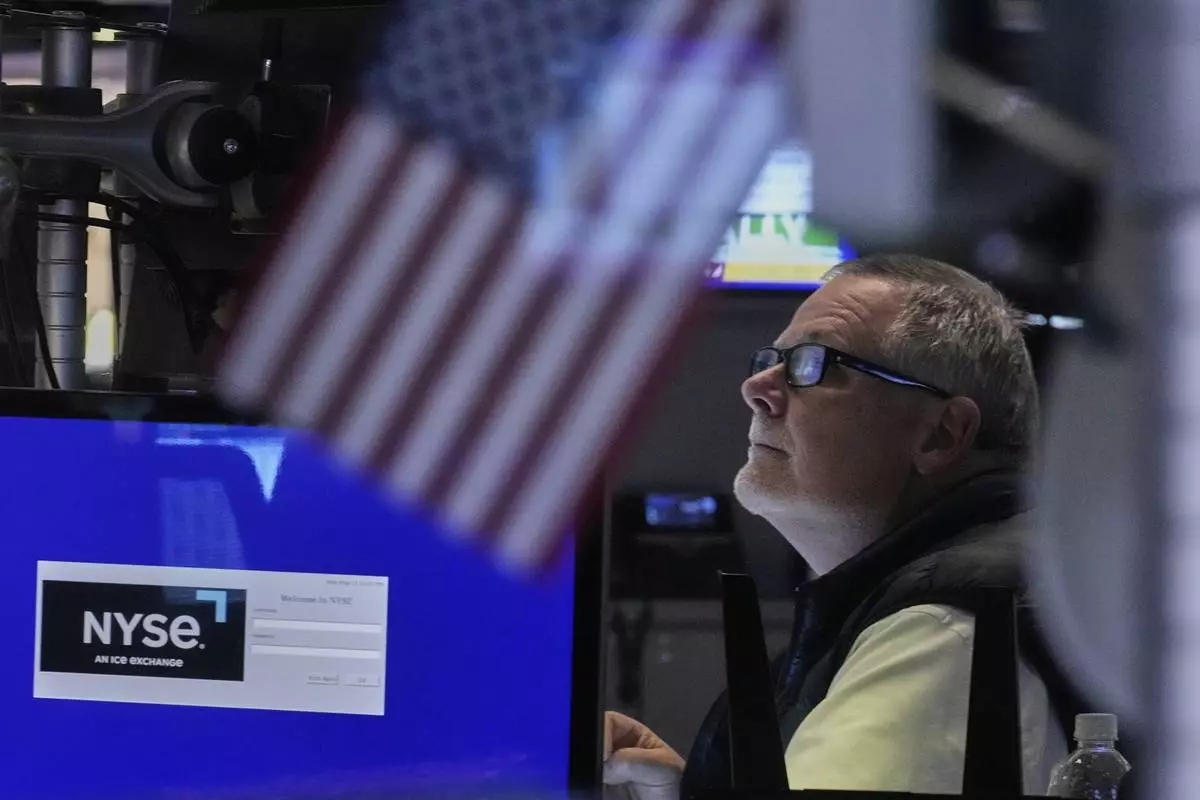
Trader Michael Conlon works on the floor of the New York Stock Exchange, Monday, May 12, 2025. (AP Photo/Richard Drew)
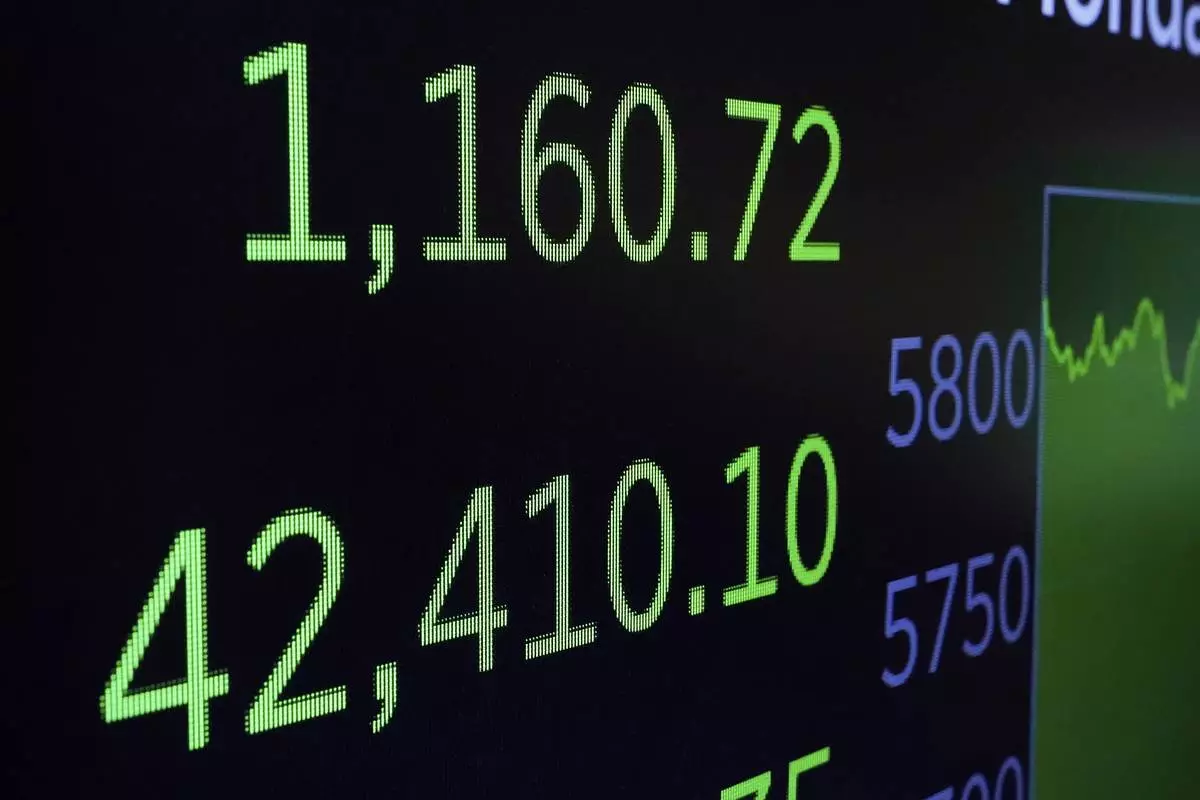
A board above the trading floor of the New York Stock Exchange displays the closing number for the Dow Jones industrial average, Monday, May 12, 2025. (AP Photo/Richard Drew)

A person walks in front of an electronic stock board showing Japan's Nikkei index at a securities firm Tuesday, May 13, 2025, in Tokyo. (AP Photo/Eugene Hoshiko)





